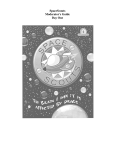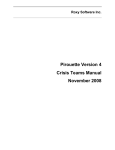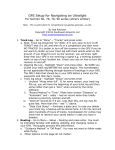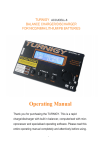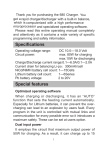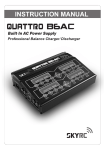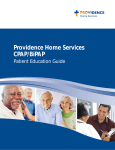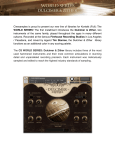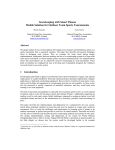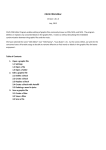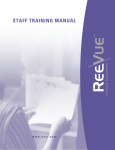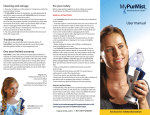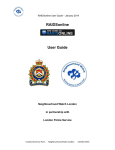Download Space Scouts Moderator Guide #3
Transcript
SpaceScouts Moderator's Guide Day Three SpaceScouts Moderator's Guide Day Three Page 1 Introduction Welcome to SpaceScouts. This program is specifically designed to teach fourth- through sixth-grade students about the biological bases of substance abuse. After viewing the program in its entirety, students should have an excellent overview of what drugs do to the brain and body. The program is not designed to prevent students from using drugs, but rather help them gain a better appreciation for what happens when people do use drugs. Program Overview The program begins with the moderator dividing participants into teams and determining which team will go first. Although SpaceScouts is primarily a video, the action stops at several points to allow for participants to complete workbook exercises and physical activities and games. The moderator may wish to assign a player from each team to be 'official scorekeepers.' Moderators The moderators are responsible for insuring the overall smooth operation of activities during the use of the program. They also help ease the transitions between the screen, physical activities, and workbook exercises. Although the moderators need to maintain a level of control, they should also be relaxed and energetic. Moderators do not need to have a background in substance abuse education in order to run SpaceScouts’ activities. Content essays from which the program was created are included in the back of this manual. There may be times when disputes occur between the teams. There also may be times when individual team members are ridiculed for answering a question incorrectly. During these times, the moderators will need to arbitrate to insure that everyone is treated with respect. Moderators may also need to show a level of adaptability and sensitivity to group characteristics. Moderators may want to show some leniency and allow honest efforts to count as correct responses to the workbook exercises. Judging the level of sophistication of the group members should guide these types of decisions. There will also be times when participants draw posters and share them with the group. Moderators should be prepared to praise all efforts and quell any negative comments or teasing by others. Moderators should stress the importance of mutual support, respect, and learning. Using This Guide This guide contains a broad overview of the SpaceScouts video and the instructions for running the activities. Also included are copies of the students’ workbook pages. Text appearing in quotes is for the moderator to speak. Text preceded by the » symbol indicates action for the moderator to take. Running the Program This program can be run from either a traditional DVD player or from a computer equipped with an internal DVD drive. Directions for each are described below: Using a DVD player The video should function as a conventional DVD disc. Refer to your player’s user manual regarding use of the Using a Macintosh Computer Insert the disc into the computer. The disc will automatically begin playing. The mouse may be used to click buttons on the screen. A button that is green will activate with one click, while a yellow button will turn green with one click and activate with another click. When you touch the track pad or move the mouse, a thin transparent window will appear that contains controls resembling a remote control (see diagram inside front cover). Use the play, pause, and forward buttons to control the flow of the program. After five seconds of no input from the track pad or mouse, this 'virtual remote' will hide itself. Note: In some instances when the disc is inserted a dialog may pop up. If this happens, clicking the 'beginning of disc' option will start the video as expected. Additional note: There is an 'eject' button on the virtual remote. If this button is clicked, the disc will be ejected from the computer. In order to continue, the disc must be fully removed and reinserted. The video will then begin playing inside a small window. To make the video fill the screen, click on the video to insure that the DVD player program is activated and then from the 'Video' menu select the 'Enter Full Screen' option. Quitting The Program On Macintosh computers, press Command-Q. Drag the disc icon to the trash icon in the dock (the trash icon will turn to an 'eject' symbol). For traditional DVD players, follow your unit’s standard operating procedures. Other Items Needed For the activities, have on hand 2 buckets or bins, a few dozen foam rubber tennis-ball-size balls (or wadded up pieces of paper), and a roll of masking tape (to mark lines on the floor to indicate the beginning and end points of the various races). SpaceScouts Moderator's Guide Day Three Page 2 Program Introduction "Welcome back to SpaceScouts. I think you're going to enjoy this program. We'll be watching some videos, doing some workbook activities, and playing some games. In today's lessons we're going to learn about substance abuse and how certain drugs affect the brain and body. But first we have to divide up into teams." » Divide kids into two teams; have the teams sit together facing the screen. Assign one team to be Red and the other Blue. Assign one person from each team to be 'official scorekeepers' or keep score yourself. "Here are your workbooks. We'll be using them later. No need to look at them now." » Hand out workbooks. "OK. Let's begin." » Launch the program. It will automatically show: • the introduction • the first scene in the kitchen » Upon completion, the program advances to an activity screen Activity #1 – Charades » Hand out Charade Cards to 6 kids; 3 from each team. There are 5 drugs to choose from; select 2 of them. Each team will have 3 cards with one specific drug—all 3 players on that team have the same drug name with a different symptom. "OK, I'm handing out some cards now. If you get a card, don't let anyone see what you have. We're going to play 'Symptom Charades.' The people who have a card will come up in front of the group and act out what's on their card. On each card there is a symptom-- a life threatening, a serious, or an unpleasant symptom, and the name of the drug that can lead to that symptom. Without using words, each actor will try to get you to guess the symptom. You will only have 30 seconds to guess. Anyone can guess, and the person who gets it right will win a point for his/her team. After all three symptoms have been guessed, you will have to guess what drug can lead to those symptoms. The person who guesses that will earn three points for his/her team. Obviously, none of the three actors can be a part of the guessing." SpaceScouts Moderator's Guide Day Three Page 3 "OK, XX team, you go first. Come on up. You have 30 seconds to get the group to guess your life-threatening symptom." » Click on the ‘Start’ button to begin the timer » If a correct guess is made before the timer expires, add a point to that player’s team score. » If no correct answer is given when the timer expires, have the student read the symptom only, and award no points. » When the timer expires, the buzzer sounds and the program advances to the next screen. » If there are still more rounds to complete, click on ‘New Round’ to return to timer screen. »Once all three symptoms have been revealed, "Okay, now we know all three symptoms. When I press the 'Start' button, you'll have 30 seconds to name the drug that is most likely to lead to those symptoms. Ready, go." » Click 'Start' button » Listen for the correct drug name. If someone guesses it before the timer expires, award that player's team 3 points. » » » » Repeat until both drug names have been revealed. Ask the 'official scorekeepers' to tally the score Click on the 'Jump' button if both teams have the same score Click on the 'Continue' button to proceed Program automatically begins to show the next video scene • Charades in Nicole's bedroom » Upon completion, the program automatically advances to workbook exercise SpaceScouts Moderator's Guide Day Three Page 4 Workbook Exercise #1 - Drugs' Effects on the Brain "Open your workbooks to page 1. You need to look at the brain and the different areas that are labeled. You will find a list of drugs at the bottom of the page. Write those drugs above the brain part that they affect. You'll have two minutes. Ready. Go" » Click on 'Start' button to begin the activity Program automatically advances to the next screen when timer expires » Click on the 'Continue' button to advance "OK, this is your chance to show your honesty. Count up how many you got correct." » Read through the all the answers on the screen "OK, add up your total scores. Everyone stand up. Now, whoever had a score less than 5 should sit down. Less than 6, you sit down... " Continue until you find the person with the highest score "Well, very good. Your team gets XX points" » Add the highest number of correct answers by a single team member to that team’s score » Ask the 'official scorekeepers' to tally the score » Click on the 'Continue' button to proceed; use the 'Jump' button if both teams have the same score "XX team, you won that activity, you get to pick which scene to see first. The other two will follow." » Winning team gets to select which of the following they want to view first; click on that one - Newspaper Office - Principal's Office - Nurse's Office The remaining will be seen automatically, followed by • Nicole and Coach • Nicole and Andre on phones • Nicole and Andre in Nicole's bedroom • Family argues in kitchen » Program automatically advances to workbook exercise SpaceScouts Moderator's Guide Day Three Page 5 SpaceScouts Moderator's Guide Day Three Page 6 Workbook Exercise #2 - Social Consequences of Drug Abuse "Get out your workbooks and open them to page two. You're going to work in teams. You will have three minutes to come up as many ways as you can for how drug use affects people and society. Ready? Go" » Click on 'Start' button to begin the activity » When the timer expires, buzzer sounds and program advances to next screen "Pencils down, everyone." » Click on 'Continue' button to proceed "So let's see what you came up with. We have some possible answers on the screen. Team XX, what do you have for Accidents?" » Award one point for each reasonable answer. » Have the other team read their answers for the same category » Award one point for each reasonable answer » Repeat until all categories are read » Ask the 'official scorekeepers' to tally the score » Click on the "Continue" button to proceed Program automatically begins to show video scenes • Family Feud in the kitchen • Coach and team » Upon completion, the program automatically advances to activity screen Activity #2 - Spoon Lay-Up Read the following instructions to the group: - Each team gets one spoon and some balls. - Line up behind a line facing a bucket. - Timer is set for 3 minutes. - Individually, a player must walk with a ball in a spoon to the bucket and drop it in. - Any time a ball hits the floor, you must return and give the spoon to the next player. - After scoring a basket, run back and give the spoon to the next player. » Click on 'Start' button to begin the activity » Add the number of balls each team got in their bucket to their score » Ask the 'official scorekeepers' to tally the score » Click on the 'Jump' button if there is a tie » Click on the 'Continue' button to proceed Program automatically begins to show remaining scenes on the disc • Pie • Andre gets promoted • Governor and Franklin • Governor, Nicole and Andre “OK everybody, good job. It’s time to take a 10-minute break and change DVDs.” » On a traditional DVD player, eject the disc and reinsert the second disc when ready to begin again. » On a Macintosh computer, press Command (apple key)-Q, drag the disc icon to the trash (the trash will turn into a eject icon). Remove the DVD and insert the new disc when ready to begin again. » Note – if a dialog box appears when the disc is inserted, choose the 'beginning of disc' option. » Additional Note – if the video doesn’t play in full screen, choose the 'Enter Full Screen' option from the 'Video' menu. SpaceScouts Moderator's Guide Day Three Page 7 SpaceScouts Moderator's Guide Day Three Page 8 Beginning of Disc #2 "OK, You just learned about The Social Consequences of Drug Abuse. Let's continue on and see what happens to Nicole and Andre" » Launch program Program automatically begins to show video scenes • Kitchen to front room • Andre and Coach » Upon completion, the program automatically advances to workbook exercise Workbook Exercise #3 – Substance Abuse Treatment Poster "Everyone open your workbooks to page three. Your job is to take three minutes to draw a poster or billboard that would help convince people to get treatment for substance abuse. Try to be as creative and influential as possible. Ready, go" » Click on the 'Start' button to begin activity "OK. Now I want everyone to share posters" » Ask everyone to hold up their posters and explain them "Now let's vote to see which poster was most convincing." » Ask kids to vote, by raising hands, which poster was most convincing » The team from which the best poster came from gets 10 points » Ask the 'official scorekeepers' to tally the score » Click on the 'Jump' button if there is a tie » Click on the 'Continue' button "OK, What hat should Andre wear while talking to Terrance? » Winning Team gets to select which of the following hats Andre will wear [only one will be seen]: - Straw - Helmet - Crown - Clown After selected scene program continues with • Nicole and Andre in Andre's bedroom • Nicole and Terrance • Aretha & Franklin in kitchen; Andre & Nicole in hall » Program automatically proceeds to activity screen SpaceScouts Moderator's Guide Day Three Page 9 SpaceScouts Moderator's Guide Day Three Page 10 Activity # 3 – Musical Chairs "Everyone stand up. Help me make a circle of chairs" » Arrange chairs in a circle, backs facing inward – 1 chair less than the number of participants "OK, now we're going to play musical chairs. I'm going to play some music. When it stops, you have to sit in a chair. If there's no chair available, you're out – no pushing, please" » Click on the ‘Start’ button to start the music "Come on, guys. I wanna see you move. Keep going and enjoy this music" » Click on the pause button (DVD controller) or space bar (keyboard) to stop and restart the music. » Click on the right arrow key on the keyboard or forward button on DVD controller to end the game. "OK, if you didn't land in a chair you're out. Let's do it again..." When the music stops, everyone must sit in a chair. The person who remains standing is out for the remainder of the game. Remove one chair from the circle, and start the music again. Repeat until there is one person left. If the music ends before you are down to one person, you may click on the 'More Music' button to begin again. » Add 10 points to the winning team's score » Ask the 'official scorekeepers' to tally the score. » Click on the 'Continue' button to proceed with video • Coach and team • Andre and Carlton • Aretha, Terrance et al • Nicole and Carlton • Nicole and Andre • Andre, Terrance, Charlene and Nicole » Upon completion, the program automatically advances to activity screen SpaceScouts Moderator's Guide Day Three Page 11 Activity #4 - Drug Treatment Match "Has everybody played Concentration before? This game is a lot like that." - Lay out large laminated cards face down on the floor in a 4x4 array - Read the following instructions: - On the face of the cards are either: o A therapy type o A description of that therapy - Teams will take turns turning over two cards - As the cards are turned over, participant must read what it says to the group - If a match is made, the team collects the cards and gets another chance to turn over two cards - If no match is made, both cards are turned face down once again and the other team gets a turn - Continue until all matches have been made. » » » » Add the number of matches to each team's score Ask the 'official scorekeepers' to tally the score Click on the 'Jump' button if both teams have the same score Click on the 'Continue' button to proceed "OK, XX team won, so you guys get to choose which scene we’ll see first of these two. Don’t worry, you’ll get to see the other one, too." » Winning Team gets to select which of the following they want to view; click on that one - Dunk - Nurse The other scene will be shown automatically, followed by • Andre and Nicole in Andre's bedroom » Upon completion, the program automatically advances to workbook exercise SpaceScouts Moderator's Guide Day Three Page 12 Workbook Exercise #4 – Crack the Code "Open your workbooks to page four. You'll have three minutes to solve the codes. Ready, go" » Click on the 'Start' button » When timer expires, buzzer sounds "Pencils down, everyone" » Click on the 'Continue' button to proceed "OK, this is your chance to show your honesty. Count up how many words you got correct." » Read through the all the answers "Did anyone get all 14 correct? How about 13?" » Continue asking until find who got the most correct » Add the highest number of correct answers by a single team member to that team’s score » Ask the 'official scorekeepers' to tally the score » Click on the 'Jump' button if both teams have the same score » Click on the 'Continue' button to proceed Program automatically begins to show video remaining scenes • Aretha and Charlene • Coffee shop • Aretha, Franklin, Andre and Nicole on front porch • Andre, Nicole and Charlene outside school • Credits "It looks like the XX team is the winner. Congratulations. I hope everyone enjoyed our program and that you learned a lot about substance abuse. Thank you so much for your attention. We'll meet next week to see how much you learned." SpaceScouts Moderator's Guide Day Three Page 13 SpaceScouts Moderator's Guide Day Three Page 14 CONTENT ESSAYS Lesson 3, Objective 1: Describe how five different drugs affect the brain and body Drug Alcohol Effect Trouble thinking & solving problems Change in emotions Problems with coordination Nicotine Increased breathing rate & blood pressure Emotional changes and addiction Stroke Cocaine Increased blood pressure & heart rate Emotional changes and addiction Problems thinking and making decisions Marijuana Memory problems Problems thinking Clumsiness Inhalants Poor judgment and decision making skills Mood changes Coordination problems Why people like taking these drugs: Alcohol - Helps people feel less shy, relaxes the body Cocaine - Provides an intense rush of energy to the brain and body. Inhalants - Relaxes the muscles, causes a feeling of euphoria Marijuana - Relaxes the muscles, causes a feeling of euphoria Nicotine - Produces a sense of calmness Alcohol Life threatening Liver damage, high blood pressure, stomach cancer Serious Brain cell death, birth defects, memory problems Unpleasant Nausea, headache, sleep problems Nicotine (in Tobacco) Life threatening Stroke, lung cancer, heart disease Serious Breathing problems, circulation problems, birth defects Unpleasant Coughing, yellow teeth, bad breath Cocaine Life threatening Stroke, seizure, heart attack Serious Birth defects, hallucinations, lung damage Unpleasant Bloody nose, headaches, nausea Marijuana Life threatening Cancer Serious Decreased ability to fight infection, increased blood pressure, lack of motivation Unpleasant Dry mouth, nausea, increased appetite Inhalants Life threatening Suffocation, heart attack, loss of consciousness Serious Nerve, liver, kidney, and brain damage Unpleasant Sneezing, coughing, nosebleeds, nausea Part of Brain Affected Frontal Lobe Limbic System Cerebellum Brain Stem Limbic System Blood vessels of brain Brain Stem Limbic System Frontal Lobes Hippocampus Frontal lobes Cerebellum Frontal lobes Limbic system Cerebellum SpaceScouts Moderator's Guide Day Three Page 15 Lesson 3, Objective 2: Describe some social consequences of drug use Drug use can cause problems in many areas of a person’s life. Drug use can cause accidents, family problems, and poor performance at school or work. Drug use can also lead to crime and violence. Finally, drug use costs both individuals and society a lot of money. People’s drug use affects their family in many different ways. Routines become disturbed and the overall level of stress in the family increases. Daily life becomes unpredictable and there are usually many more arguments in a family when someone uses drugs. Communication is poor between family members in a house where drugs are used. Family finances are strained as the user tries to find more money to buy drugs. Many times drug use leads to separation or divorce. On the job or at school, drug use causes many problems. People who use drugs are more likely to miss school or work. They also perform poorly and don’t enjoy their work. Many times people who use drugs are fired from their jobs or expelled from their schools. Every year, thousands of people die from accidents caused by drug use. These accidents include fires caused by smoking in bed and car accidents caused by drinking and driving. Many of these accidents affect both the drug user and innocent bystanders. Drug use can lead to crime and violence. Excessive drinking is involved in most cases of spouse abuse. Nearly all murders are committed by people who were under the influence of drugs at the time of the crime. Also, people who use drugs may commit robberies. They use the money they steal to support their drug addiction. Drug use causes both individuals and society a lot of money. Heavy drinkers may spend up to $6,000 a year on alcohol. Smoking a pack of cigarettes a day costs over $1000 a year. Often personal finances are wiped out as the user tries to find money to buy more drugs. Society also spends a lot of money because of drug use. The government spends millions of dollars on prevention programs as well as treating people who have drug problems. Finally, it costs a lot of money to keep people with drug problems in jail. SpaceScouts Moderator's Guide Day Three Page 16 Lesson 3, Objective 3: Describe why treatment for substance abuse is so difficult Treatment for a drug addiction is not like treatment for some kinds of medical conditions. For example, an ear infection goes away after you take the medication your doctor prescribes. Drug addiction is different. It is a life-long problem, just like diabetes or high blood pressure. Even when people get treatment, there is always a chance for relapse. This means that they may start using drugs again. Getting people with drug addictions into treatment can be very difficult. Often they are so addicted they cannot see that drug use is causing problems in their lives. Sometimes people may understand that drug use is causing problems in their lives, but they don’t want to stop because it feels so good. Helping people judge the pros and cons of using drugs can help them decide that they want to be in treatment. When they finally enter treatment, people need just the right type of program. The program must match their personality and the kind of drug they are using. Treatment programs may not be located in a convenient area of town, especially for people who don’t have their own car. Also, treatment programs can cost a lot of money. This is a big problem for people who don’t have insurance. Treatment for drug abuse can be long and difficult. Because of withdrawal, it can be physically painful to stop using drugs. It can also be hard to learn to live in new ways without using drugs. Sometimes people need to stay in the hospital until they're able to stop using drugs. And sometimes people have other medical problems that were caused by drug abuse that also need to be treated. SpaceScouts Moderator's Guide Day Three Page 17 Lesson 3, Objective 4: Describe differences between medical & non-medical treatments for drug abuse Some types of drug addictions can be treated with medicine. These medical treatments help people stop abusing drugs. Some medical treatments help people stop smoking. Nicotine replacement therapy allows people to slowly reduce the amount of nicotine they take into their body. This is good because it does not expose them to the harmful chemicals in tobacco. Wearing a nicotine patch or chewing nicotine gum can help people become less dependent on smoking cigarettes. Another type of medical treatment to help people stop smoking uses special medicine. This medicine helps reduce cravings for nicotine. It also helps reduce withdrawal symptoms. There are also medical treatments for alcohol abuse. A medicine called antabuse causes severe nausea whenever it is mixed with alcohol. The idea is that as long as people take antabuse, they won’t drink alcohol because it will make them feel so bad. There are no medical treatments for people who are addicted to marijuana, inhalants, or cocaine. Fortunately, there are other kinds of treatments that can help people overcome these addictions. These nonmedical treatments also work well for people who are addicted to alcohol and nicotine. Group therapy is the most common treatment for people with a drug addiction. In this type of treatment, a group of people meets with a counselor. The counselor helps them understand the reasons they started using drugs. The counselor also helps group members find new ways of living without drugs, and teaches them better ways to deal with their problems. Residential treatment programs are good for people who have severe addictions. These programs provide treatment to people while they live at a special treatment center. Outpatient treatment allows people to live at home and attend group therapy sessions on weekends and evenings. This type of treatment is good for people who are able to keep a regular job. Individual therapy is similar to group therapy, but in this type of treatment people see a counselor by themselves. Family therapy is similar to group therapy. But instead of unrelated people, a person's whole family is involved. The family helps support the person who has an addiction. A family therapist helps the family understand the causes of the drug addiction and how they can make positive changes. Self-help groups are another possible treatment option. These groups allow people to get together without a counselor and talk about their problems. Self-help groups provide group support and often have a spiritual focus. Many times, people need both medical and non-medical treatments. But with the right treatment, people can overcome their addictions.





















